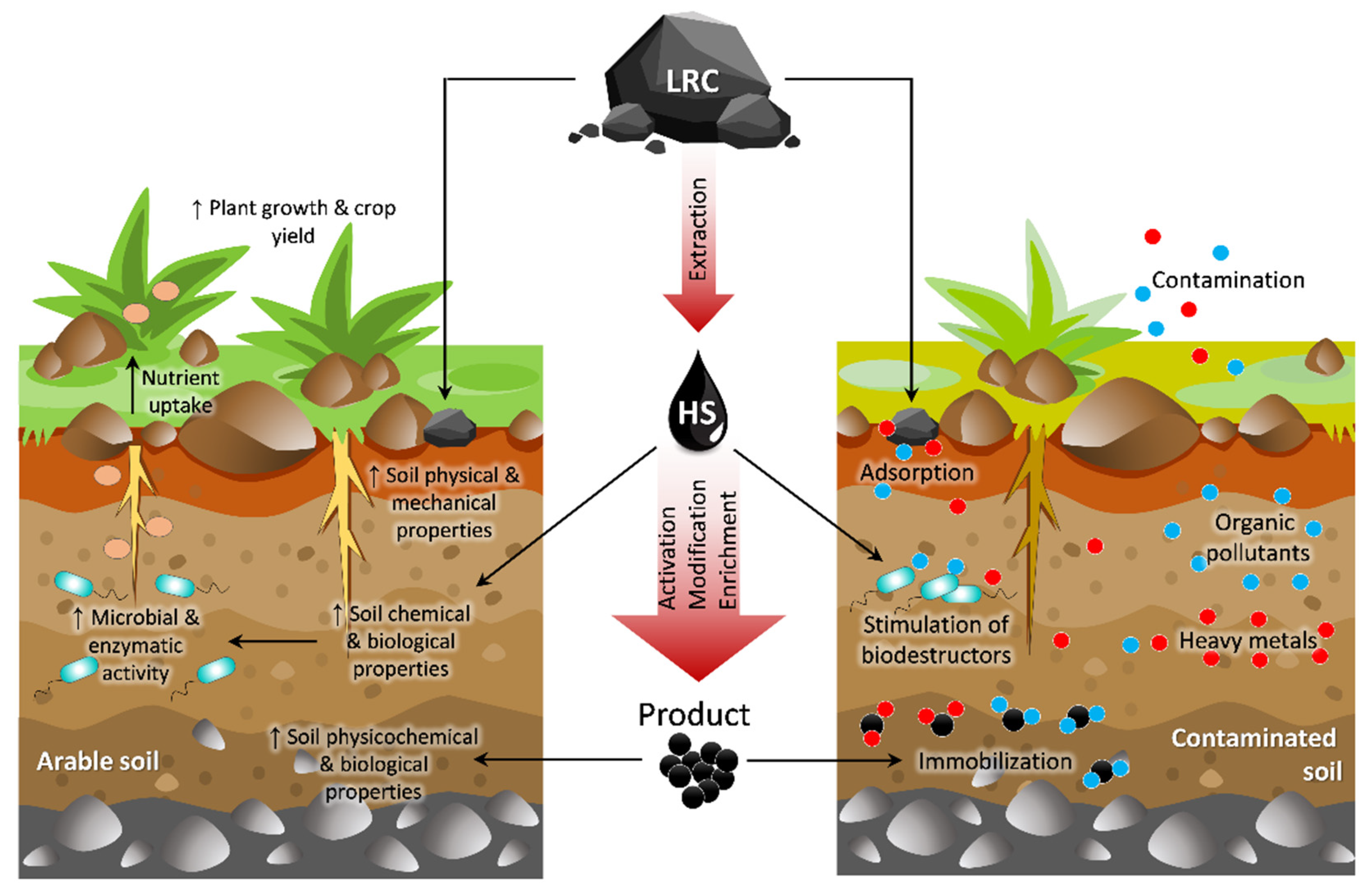Leonardite: The Soil Amendment That Can
Leonardite: The Soil Amendment That Can
Leonardite is a type of brown coal that is formed from the remains of plants that lived millions of years ago. It is a rich source of humic substances, which are naturally occurring organic compounds that have a number of beneficial effects on soil health.
Humic substances are known to improve the physical, chemical, and biological properties of soil. They can increase water retention, improve drainage, and reduce soil acidity. They can also chelate nutrients, making them more available to plants. In addition, humic substances can stimulate the growth of beneficial soil microorganisms, which can further improve soil health.
As a result of these benefits, leonardite has been used for centuries as a soil amendment. It is particularly beneficial for improving the quality of poor or degraded soils. Leonardite can also be used to remediate contaminated soils, as it can help to bind up pollutants and prevent them from being released into the environment.
In recent years, there has been growing interest in the use of leonardite for a variety of other applications. For example, leonardite can be used as a fertilizer, a compost additive, a feed supplement, and a biostimulant. It is also being explored as a potential source of renewable energy.
Benefits of Leonardite
The benefits of leonardite for soil health are well-documented. Some of the key benefits include:
- Increased water retention
- Improved drainage
- Reduced soil acidity
- Chelation of nutrients
- Stimulation of beneficial soil microorganisms
- Remediation of contaminated soils
In addition to these benefits, leonardite has also been shown to have a number of other potential benefits, including:
- Improved plant growth and yield
- Increased stress tolerance in plants
- Reduced susceptibility to pests and diseases
- Enhanced nutrient uptake by plants
- Improved soil structure
- Increased carbon sequestration
How to Use Leonardite
Leonardite can be used in a variety of ways, depending on the desired application. For example, it can be applied directly to soil as a soil amendment, or it can be used to make compost or other organic fertilizers. Leonardite can also be added to water to make a foliar spray, or it can be applied to seeds or seedlings before planting.
The amount of leonardite that needs to be used will vary depending on the specific application. For general soil improvement, a rate of 1-2 tons per acre is typically recommended. For remediation of contaminated soils, a higher rate may be necessary.
Safety Precautions
Leonardite is generally considered to be safe to use. However, it is important to wear gloves and eye protection when handling leonardite, as it can cause skin and eye irritation. Leonardite should also not be ingested.
Conclusion
Leonardite is a versatile and beneficial material that can be used to improve soil health and plant growth. It is a natural product that is non-toxic and environmentally friendly. Leonardite is a valuable tool for gardeners, farmers, and anyone else who wants to improve the quality of their soil.
Leonardite is a naturally occurring, organic soil amendment that is rich in humic and fulvic acids. These acids have a number of beneficial properties for plants, including:
- Improving soil structure and drainage
- Increasing water retention
- Reducing soil acidity
- Stimulating plant growth and root development
- Increasing nutrient availability
Leonardite can be used to improve the health and productivity of a wide variety of soils, including sandy, clayey, and alkaline soils. It is also a safe and effective amendment for organic gardening.
If you are interested in learning more about leonardite soil amendment, I recommend visiting the website Garden Wiki. This website provides a wealth of information about leonardite, including its benefits, uses, and application rates. You can also find a list of retailers who sell leonardite products.
FAQ of leonardite soil amendment
- What is leonardite soil amendment?
Leonardite is a naturally occurring organic soil amendment that is rich in humic and fulvic acids. These acids are beneficial to plants because they help to improve soil structure, water retention, and nutrient availability. Leonardite can also help to reduce soil acidity and salinity.
- What are the benefits of using leonardite soil amendment?
Leonardite soil amendment can offer a number of benefits to plants, including:
- Improved soil structure: Leonardite helps to break down clay and other soil particles, making it easier for water and air to move through the soil. This can help to improve drainage and aeration, which can lead to healthier plants.
- Increased water retention: Leonardite can help to improve the water-holding capacity of soil, which can be beneficial in areas with low rainfall or during periods of drought.
- Enhanced nutrient availability: Leonardite can help to make nutrients more available to plants by chelating them, which means binding them to organic molecules. This can help plants to absorb nutrients more efficiently.
- Reduced soil acidity and salinity: Leonardite can help to neutralize soil acidity and salinity, which can create a more favorable growing environment for plants.
- How do I use leonardite soil amendment?
Leonardite soil amendment can be used in a variety of ways, including:
- Mixing it into the soil before planting
- Applying it to the soil surface as a topdressing
- Using it as a liquid fertilizer
- Adding it to compost piles
The amount of leonardite soil amendment that you need to use will vary depending on the type of soil you have and the desired results. It is always a good idea to consult with a soil expert to determine the best application rate for your specific needs.
- Is leonardite soil amendment safe for plants and animals?
Yes, leonardite soil amendment is safe for plants and animals. It is a naturally occurring substance that has been used for centuries as a soil amendment. Leonardite is not toxic to plants or animals, and it does not contain any harmful chemicals.
- Where can I buy leonardite soil amendment?
Leonardite soil amendment can be purchased from a variety of retailers, including garden centers, nurseries, and online retailers. When purchasing leonardite soil amendment, it is important to choose a reputable brand that offers a high-quality product.
Image of leonardite soil amendment
5 different images of "leonardite soil amendment" from Pinterest:
- Image 1: A bag of leonardite soil amendment sitting on a wooden table. The bag is labeled "Leonardite Soil Conditioner" and the company name "Dr. Earth".

- Image 2: A gardener using a shovel to add leonardite soil amendment to a flower bed. The soil amendment is a dark brown color and has a crumbly texture.
- Image 3: A close-up of a handful of leonardite soil amendment. The soil amendment is made up of small, dark brown particles.

- Image 4: A plant growing in soil that has been amended with leonardite. The plant is healthy and green, and the soil around it is dark brown and crumbly.

- Image 5: A row of vegetables growing in soil that has been amended with leonardite. The vegetables are healthy and green, and the soil around them is dark brown and crumbly.


Post a Comment for "Leonardite: The Soil Amendment That Can"